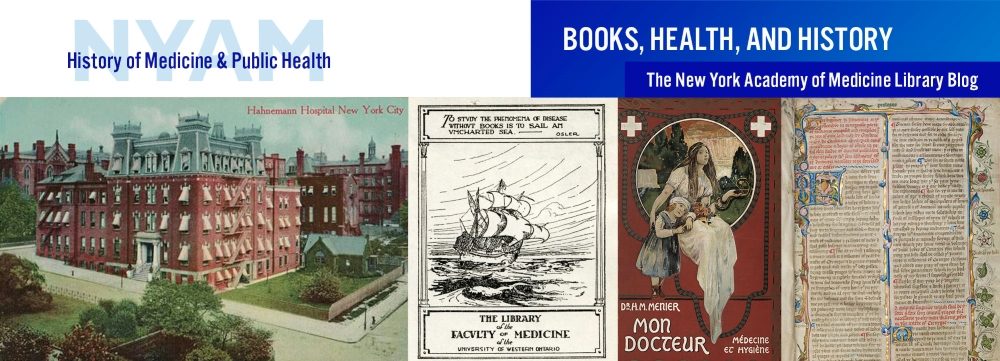By Arlene Shaner, Historical Collections Librarian
The Library has two residential research fellowships, the Paul Klemperer Fellowship in the History of Medicine and the Audrey and William H. Helfand Fellowship in the History of Medicine and Public Health. While there is plenty of information on our website about how to apply for our fellowships, there is no information there about the people for whom they are named, and it seems appropriate to share a little bit about them.
Paul Klemperer (1887–1964) spent much of his career at Mount Sinai Hospital, where he held the position of pathologist from 1927 until his retirement in 1955. Born outside of Vienna, Klemperer first enrolled at the University of Vienna, intending to become a lawyer. At the suggestion of his father, he took a class on psychoanalysis taught by family friend Sigmund Freud and began to study medicine instead. After receiving his medical degree in 1912, he spent two years studying pathological anatomy, and then served as a physician during World War I. In 1921, he emigrated to the United States, spending a year in Chicago before moving to New York, teaching briefly at the New York Post-Graduate Medical School before joining the staff at Mount Sinai. He also taught pathology at the College of Physicians and Surgeons of Columbia University for many years, and after retirement continued to teach the Albert Einstein College of Medicine.

His students and colleagues were devoted to him. In 1962, the Academy presented him with the Academy Medal for Distinguished Contributions to Biomedical Science. In his remarks George Baehr, his colleague at Mount Sinai, noted that Klemperer’s skill as a pathologist combined with his skill as a teacher made him a much-loved figure in all the institutions to which he had a connection. Neuropathologist Stanley Aronson, in a 1989 reminiscence in the Mount Sinai Journal of Medicine, recalled him as “one who was shy yet effective, retiring yet generous, undemonstrative yet passionate, learned yet learning, always learning. For he was truly our teacher.”[1]
After he retired, Klemperer devoted significant time to the study of the history of medicine. He wrote the preface and introduction to the Academy’s publication of a translation of Giambattista Morgagni’s noted book on pathology, The Seats and causes of diseases investigated by anatomy, as well as translating five letters of Morgagni. He also wrote the introductions to several other volumes in the Academy’s history of medicine series. To honor his memory and his devotion to the history of medicine, some years after his death an anonymous group of donors endowed the fellowship that bears his name, first awarded in 1996.
William H. Helfand (1926–2018), a Philadelphia native, pursued a career as a pharmaceutical executive for Merck. His work dovetailed with his collecting interests in prints, posters, and such pharmaceutical ephemera as trade cards and almanacs, and he wrote extensively on their social history.[2] He and his wife, Audrey, endowed positions and fellowships at several institutions, including the Philadelphia Museum of Art, the Library Company of Philadelphia, and the Grolier Club. In 1998, the couple endowed the NYAM Library fellowship that bears their name, with the first fellowship awarded in the 1999–2000 academic year.

From the beginning, the Helfand fellowship supported research on the ways that visual materials enhance the study of the history of medicine, public health, and the medical humanities. Our own Library collections are far richer in these areas because Bill supplemented his endowment with gifts of materials from his own collections, Chief among these is the William H. Helfand Collection of Pharmaceutical Trade Cards, which is digitized and available here. In addition to trade cards, Bill gave the Library almanacs, broadsides, caricatures, prints, sheet music, and other medical ephemera. Our Helfand collection is one of many; others can be found at the Huntington Library, Yale University, Duke University, and the Library Company of Philadelphia.
If you are a scholar working on a history of medicine project, please consider our fellowships. Applications are being accepted until September 17, 2021, for a month’s residence at the Library. Successful applicants will be notified by October 22, and the next two fellows may work any time during the 2022 calendar year.
Lists of all the projects that have been supported through these endowments can be found on the fellowship pages for the Klemperer Fellowship and the Helfand Fellowship; application procedures are found there as well.
_________
[1] Baehr, George. “Citation and Presentation of the Academy Medal to Paul Klemperer, MD.” Bulletin of the New York Academy of Medicine 38, no. 4 (1962): 240; Aronson, S. M. “The legacy of Paul Klemperer.” The Mount Sinai Journal of Medicine, New York 56, no. 5 (1989): 347–350.
[2] “William Helfand, a Collector Intrigued by Quackery, Dies at 92,” The New York Times, October 5, 2018.
